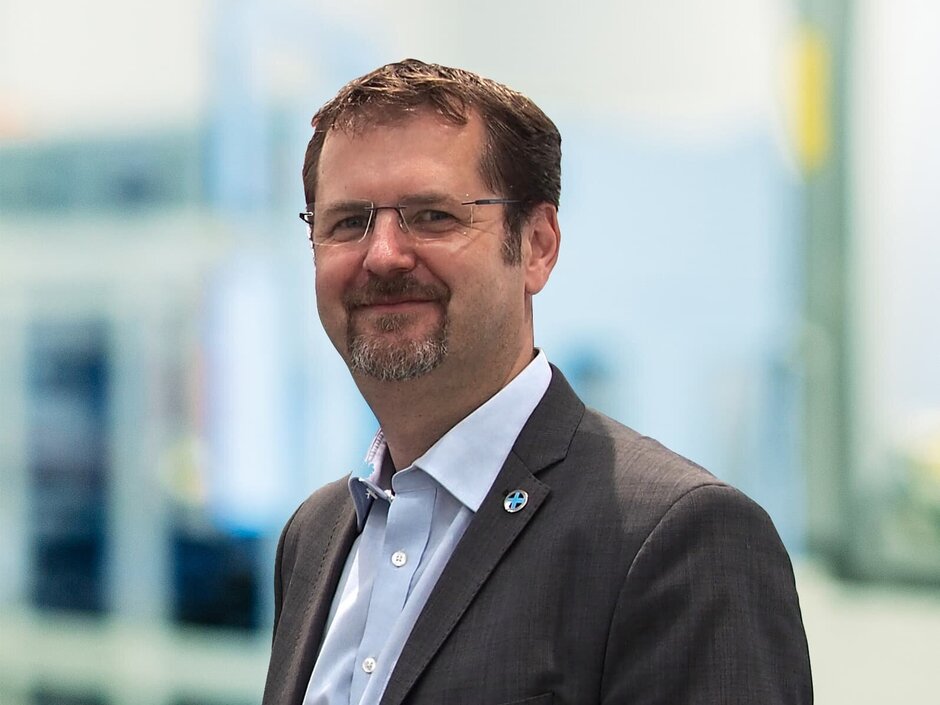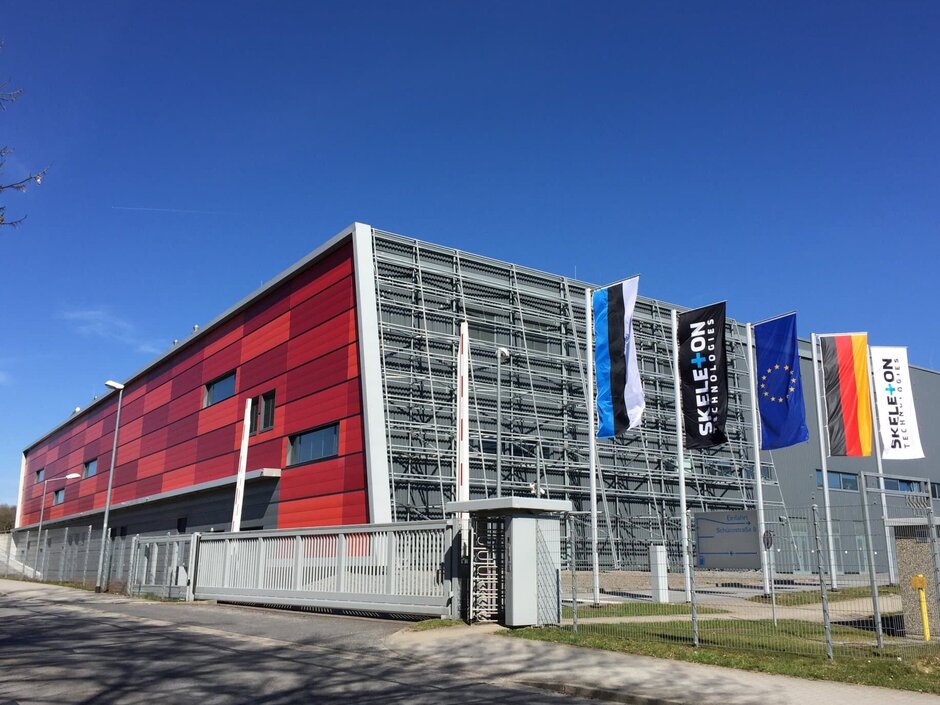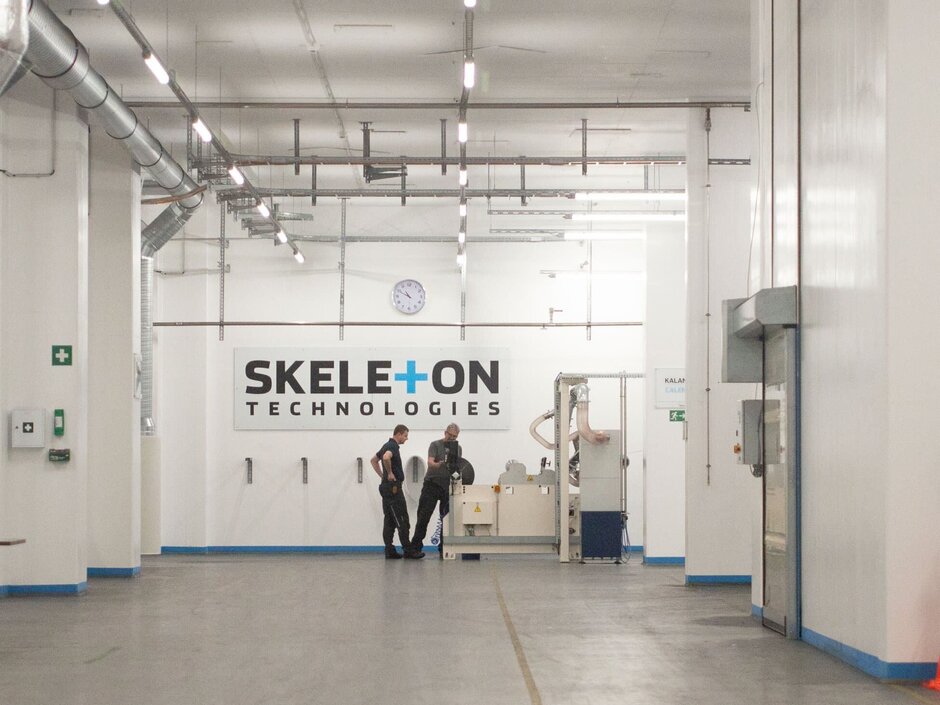Thomas Hucke
Back to the future
A fresh start for a successful start-up: Thomas Hucke started a new chapter in his professional career in May 2018. As technical manager of the company Skeleton Technologies, the world's only manufacturer of graphene-based ultracapacitors based in Großröhrsdorf, he and his team are helping to shape the future of the energy storage market today. The return to Dresden, back to family and old friends was the other big factor that made the decision to come back easy for him. A success story, without any obstacles.

A quiet, underfrequent hum is in the air. Besides the noise of the wheels on the asphalt, there is nothing to be heard. The brightly colored colors of the car display show a pulsating battery symbol. Each time the brake pedal is depressed, the battery indicator gets a little larger, and consumption drops. Electric cars are the future of the automotive industry and play a key role in the energy transition in Germany. Thomas Hucke, CTO and Managing Director at Skeleton Technologies, is also involved in an important part of the technology, which should enrich the market today and in the future and which will determine the future of mobility step by step. In addition to extending the range and lifespan of batteries for electric vehicles, ultracapacitors from Saxony are used, for example, in energy storage systems for renewable energies from wind and solar systems or to save fuel on buses and trucks.
The call of change
It all started with his studies as a process engineer at the technical university in his hometown of Dresden and in Freiberg. After graduation, he started as a development engineer in Pirna, then moved from the region to Switzerland for five years and then to Frankfurt for three and a half years. The decision to change location was always driven by the desire for professional development. “All in all, I have been dealing with batteries and energy storage in general and graphene and carbon in particular for almost 20 years” Hucke says. “But with a growing family of your own, you are increasingly dependent on the support of your grandparents and the whole family. I was able to do both with Skeleton in Dresden.”

The way back
And so in early 2018 there were first talks with Skeleton and its CEO Taavi Madiberk. “The step into a start-up company needs to be considered carefully, but the decision was relatively easy for me, also because Skeleton is established in the market and because numerous well-known industrial partners show great interest in the technologies.” But above all, Thomas Hucke saw many advantages. Processes run more dynamically, you have more flexibility, more say than in traditional corporate structures. “This gives younger employees the opportunity to contribute productively to the entire company”, Sophie Genschow adds, who works in the Human Resources department at Skeleton Technologies. In some respects, working in a start-up is certainly a bit unconventional. “I signed my employment contract while Mr. Madiberk was passing through in a café at the airport”, says Hucke with a smile. But that's exactly what he appreciates now. Effective work always comes first, tasks have to be done and you can freely organize your time. A luxury that the father of two appreciates very much.
Return without obstacles
Contrary to the trend, the Hucke family returned without any problems. “We only applied for an apartment in Dresden and actually got it. After a good four weeks, our children were accommodated around the corner in day care centers. Even at the removal nothing broke”, says Hucke. After the frequent changes of location, you develop a kind of routine, you know what is to be done and how and then you can tick off everything gradually. The move to Dresden took place parallel to the start of work at Skeleton in early May. After that, getting used to the old homeland went very quickly. Warmly welcomed by family and old friends, the family now enjoys the cultural opportunities of the state capital or the nature of Saxon Switzerland. “The city, including the area around it, has developed significantly”, says Thomas Hucke, and then brings it back to his work area. “A great advantage here is the support of the state government and economic development, the promotion of lighthouse projects. In the technology sector, the region does not have to hide from the big players in Germany.” Sophie Genschow adds that the existing technology cluster in the vicinity enables many networks. The people in the area are open-minded and focused on doing a good job and building lasting partnerships. Both think that these many advantages should be marketed even more. The "polished" image of the region is a bit missing. “Unfortunately, it still has a different weight, whether a year appears in Munich or a year in Dresden”, says Sophie Genschow. But the positive development is progressing and is attracting innovative start-ups like Skeleton to the growth region.

A competitive market
In the technology area, skilled workers are in demand and rarely on the market for long. “You have to be quick and the best thing is to accompany potential specialists during their training”, explains Sophie Genschow. The company makes use of all available measures, in addition to high-reach online portals, and local and regional offers. And you also notice the increasing awareness of the company. “We are getting more and more inquiries from potential applicants who approach us proactively”, says Ms. Genschow. But she also sees the danger of a growing shortage of skilled workers in the future. Because the successful development of a company depends on its employees. Projects like the “Wachstumsregion Dresden” are a very important partner.
The green battery symbol on the car display now lights up continuously. The full energy is available for the drive. A step on the accelerator gently pushes you into the driver's seat. You can almost feel the progress. Progress for which Thomas Hucke found his way back to his homeland. Back to the “Wachstumsregion Dresden”. Back to the Future.
Interview and Text: Peter Glumbick
